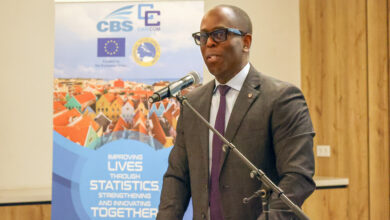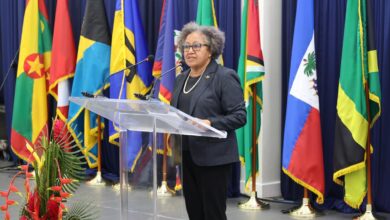Ambassador David Prendergast, Director, Sectoral Programmes at the CARICOM Secretariat, made opening remarks at the ‘Resilient Caribbean Initiative: A Reflection Workshop on Achievements and Lessons Learned’ at the Mexico-CARICOM-FAO Initiative ‘Cooperation for Climate Change Adaptation and Resilience in the Caribbean’ Workshop. The event was held in Panama City, Panama, 19-20 September 2024.
Please see his remarks below:
Buenos dias a todos!
Moderator,
Ms. Karen de Brouwer, Ministry of Foreign Affairs, Mexico
Mr. Tony Rojas, AMEXCID
Dr. Renata Clarke, FAO
Participants, Project beneficiaries, partners, and stakeholders
I am pleased to represent the CARICOM Secretariat at this Resilient Caribbean Initiative Reflection Workshop on Achievements and Lessons Learned as we work to increase the resilience of agrifood systems to climate change and other global shocks. A special thank you to the Food and Agriculture Organisation (FAO) and our hosts, Panama, for the excellent hospitality and arrangements. We welcome the opportunity to reflect, engage, listen, learn and discuss challenges as we move forward with this important Project for the Region, primarily aimed at enhancing food security, nutrition, livelihoods, and wellbeing among the most vulnerable populations in the Region.
At the outset, we extend our sincere appreciation to the Government and the people of Mexico for providing the support for this Regional Project that has positively affected the lives of the beneficiaries in the fourteen (14) CARICOM Member States in which it is being implemented.
I also express our gratitude to the implementers of the project, in particular, the FAO led by Dr. Renata Clarke and her team. It has truly been a pleasure working with you and your team on the implementation of this Project and we look forward to the continued collaboration.

I believe we can speak for most of the Region by saying that this was, indeed, a good investment and a fruitful intervention as we tackle the challenges that vulnerable regions like ours face because of climate change. We note from the summary of the Project for the first six (6) months of this year, specifically the update on the expected outputs. It reveals those outputs that have been achieved so far, those that are on the way to completion and those require further work to completion. We look forward to hearing further from you as we do a deep dive in our discussions over the next two days. We note from Mr. Rojas’ intervention the importance of the gender component and reiterate the fundamental importance of taking account of this in the Project and going forward.
There is no doubt that across the Region, the new technologies and the various training and capacity-building sessions would have left lifelong, sustainable mechanisms that will assist in ensuring that the Region becomes more resilient to climate change. This Project, I believe, can lend itself to serving as a model to support interventions that aim to achieve resilient livelihoods and well-being through this practical modality of South-South cooperation.
This Workshop is, therefore, timely and of significant importance. It will allow us to explore and have critical exchanges on the lessons learnt, while strengthening our bonds, our understanding and in developing even more inclusive and collective partnerships for our Region.
Importance to the 25 by 2025 and Food Security
For us at the CARICOM Secretariat, the Project is very appropriately aligned with the objectives of our Vision 25 by 2025 Regional Food and Nutrition Security Initiative. The objectives of the 25 by 2025 Initiative include focus on the critical areas of investment, climate change adaptation, research and development, digitisation, risk management and production inputs, all of which are required for greater food security.
The interventions implemented by the Project cut across all the thematic areas which have been prioritised under the 25 by 2025 Initiative. Its focus on providing solutions in tackling and coping with and addressing climate change, food and nutrition security, development of the aquaculture sector, water management, school feeding, access to finance and knowledge management and retention are all aligned with the 25 by 2025 Initiative.
This is squarely in line with the agriculture and sustainable development goals and priorities of CARICOM. We believe that this effort will contribute to achieving the 25 by 2025 Regional Food Security Initiative. The CARICOM Secretariat remains committed to working together with our partners to achieve the goal of zero hunger.
Reflections on the Project
We hope that we will leave this Workshop with an exchange and transfer of knowledge, clarity on the lessons learnt, and how we may address these pertinent issues. It is our vision that through this reflection process and sharing that we will build on the knowledge which we have already gained and that this will allow all stakeholders to become stronger and even more focused. This will be an important tool as we design and formulate new project interventions to address the issues facing our Region for achieving better food and nutrition security and, ultimately, zero hunger.
We must spend some time reflecting and discussing the advances which have been made in providing innovative water and energy solutions to the farmers of the Region. We must also spend time strategising how we will expand the training which has been provided in accessing climate funding. We must also seek to promote as well as take the lessons learnt from the school feeding component of the Project, including efforts at influencing our students to eat healthily and become more aware of food and nutrition security. Let us deliberate on the model that allowed for a regional aquaculture association to be registered which has demonstrated that organised producers’ groups can work.
Similarly, during our discussions, we must also look at some of the bottlenecks that we should address going forward. We must collectively find creative solutions to reduce any issues or frictions that may have caused delays during project implementation. This will only be achieved through collective action and agreement as the Project beneficiaries and implementers.
In closing, I again express gratitude to the Government of Mexico, the FAO and our Member States and stakeholders. I urge participants to make full use of the technical information and applications, which will be provided as we continue to chart the course to being more resilient to climate change and its effects on our Region’s food security.
Thank you!






